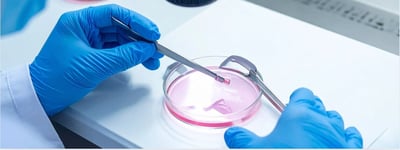.jpg)
1 September 2023
PCOS Awareness Month
As September is Polycystic Ovary Syndrome Awareness Month we talk to Dr Venkat, Director of Harley Street Fertility Clinic about the condition, how it can affect a woman’s fertility and treatment options.
“Polycystic ovary syndrome or PCOS as its commonly referred to, is an endocrine disorder which affects around 1 in 5 or 20% of women in the UK. No one is completely sure why some women are affected but the condition tends to run in families and is related to hormonal imbalances – it is one of the leading causes of fertility problems. The condition can affect a woman’s appearance and therefore self-esteem and if not properly managed, can lead to additional health problems later on such as type 2 diabetes and high cholesterol levels.
The term polycystic ovaries, describes ovaries that contain many small 'cysts' about twice as many as usual, they are normally no bigger than 8 millimetres and located just below the surface. The ‘cysts’ are not true cysts, they do not get bigger or burst, and do not require surgical removal. Crucially, they do not lead to ovarian cancer. In fact, they are actually follicles that have not matured to be ovulated – so the term polycystic ovary syndrome is a red herring. The follicles are under-developed sacs in which eggs develop, however these sacs are often unable to release an egg, which means that ovulation commonly doesn't take place, thereby causing fertility issues.
Signs and symptoms usually start to appear in a person’s late teens or early twenties. These include irregular periods or no periods at all, excessive hair growth (on the face, chest or back), weight gain and oily skin and/or acne.
Unfortunately, there is no cure for polycystic ovary syndrome – just treatments for the individual symptoms. Certainly, maintaining a healthy weight by eating a well-balanced diet and regular exercise can help to control the symptoms. Medication is also available to treat excessive hair growth, irregular periods and fertility problems as a result of the condition. If a person still struggles to get pregnant following medication, a simple surgical procedure called laparoscopic ovarian drilling (LOD) may be recommended.
So, if you’re suffering from PCOS, take heart, most women with condition are able to get pregnant.”
For more information call the clinic on 020 7436 6838.
.jpg?upsize=true&upscale=true&width=400&height=200&name=Untitled%20design%20(1).jpg)

